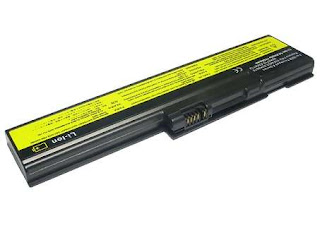How to Prolong Rechargeable Battery Life
 |
| Dell Laptop Computer |
1. Avoid deep discharge and instead, try to charge your laptop battery more often between uses. The smaller the depth of discharge, the longer the battery will last.
2. Avoid storing the battery in full discharged state. As the battery will self-discharge overtime, its voltage will gradually lower, and when it is depleted below the low-voltage threshold (2.4 to 2.9 V/cell, depending on chemistry) it cannot be charged anymore because the protection circuit (a type of electronic fuse) disables it.
 | Rechargeable Laptop Battery |
3. Lithium-ion batteries should be kept cool; they may be stored in a refrigerator if deemed necessary. The rate of degradation of Lithium-ion batteries is strongly temperature-dependent; they degrade much faster if stored or used at higher temperatures.
4. Having a battery fully charged and the laptop plugged in is not harmful, because as soon as the charge level reaches 100% the battery stops receiving charging energy and this energy is bypassed directly to the power supply system of the laptop.
5. However there's a disadvantage in keeping the battery in its socket when the laptop is plugged in, but only if it's currently suffering from excessive heating caused by the laptop hardware. In a normal usage, if the laptop doesn't get too hot (CPU and Hard Disk around 40ºC to 50ºC) the battery should remain in the laptop socket;
In an intensive usage which leads to a large amount of heat produced (i.e. Games, temperatures above 60ºC) the battery should be removed from the socket in order to prevent unwanted heating. Overheating, along with the fact that it has 100% of charge, is the great enemy of the lithium battery and not the plug, as many might think.
Discharging Batteries

6. Fully discharging (until laptop power shutdown, 0%) should be avoided, because this stresses the battery a lot and can even damage it. As recommended, It’s best to perform partial discharges to capacity levels of 20~30% and frequent charges, instead of fully discharging followed by a full charge.
Battery Safety
Lithium-ion batteries can rupture, ignite, or explode when exposed to high temperature. Short-circuiting a battery will cause the cell to overheat and possibly to catch fire. Adjacent cells may then overheat and fail, possibly causing the entire battery to ignite or rupture. In the event of a fire, the device may emit dense irritating smoke.
Replacing the lithium cobalt oxide cathode material in lithium-ion batteries with a lithium metal phosphate such as lithium iron phosphate, improves cycle counts, shelf life and safety, but lowers capacity. Currently, these 'safer' lithium-ion batteries are mainly used in electric cars and other large-capacity battery applications, where safety issues are critical.
Battery Recycling and Disposal Guide for Households
If you are having a difficult time finding out what to do with used batteries and where you can take them to be recycled or safely treated and disposed, then you should find a solution here on this page. Whether you have a AAA, AA, C, D, watch, button, hearing aid or car battery, there is a solution. Use the table of contents to jump ahead to the summary table if you are not interested in the background information.
Environmental hazards of household batteries
Regulations
Types of batteries
Battery facts and statistics
What you can do
Where to recycle rechargeable batteries (Nickel-Cadmium NiCd, Metal Anhydride, Lithium, etc.)
Click here to read more: http://www.ehso.com/ehshome/batteries.php


Overheating is the most common problem of computer batteries. Some computers are prone to heating up quicker than others, and in these cases, it would be best to only use either the battery or the plug at any one time. Besides, many brands are now putting out batteries that have up to 10 hours battery life (albeit with light usage – no videos, games, or music), so relying on the battery alone for power is no longer a problem. Using portable laptop fans, usually powered via the USB ports, is also advisable to keep laptops and batteries cool, or at least to slow down the heating.
ReplyDeleteBenita Bolland
If the battery is consistently hot to the touch, remove it and allow it to cool down first making sure it is close to room temperature before reinserting it. Should the battery continue to overheat or get too hot it will probably need to be replaced. Always replace a defective battery as soon as possible as it could cause irreparable damage to the laptop in question. In addition to overheating failure to charge or hold a charge is another very common issue with laptop batteries
ReplyDeleteThe CPU thermal grease definitely has to be replaced when it looks dried out and feels very hard to promote effective cooling.